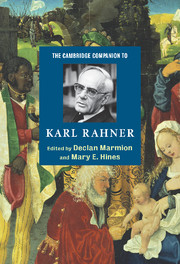Introduction
Published online by Cambridge University Press: 28 May 2006
Summary
It is both terrible and comforting to dwell in the inconceivable nearness of God, and so to be loved by God that the first and last gift is infinity and inconceivability itself. But we have no choice. God is with us.
Prayers for a LifetimeThe year 2004 marks the hundredth anniversary of the birth of Karl Rahner, S. J., who, it is widely acknowledged, was the dominant theological voice of the Roman Catholic Church in the twentieth century. For many, his theology has come to symbolize the Catholic Church's entry into modernity, an event publicly and ritually celebrated at the Second Vatican Council. Not surprisingly in the forty years since the Council and the twenty years since the death of Rahner both the Council and the theology of Karl Rahner have undergone some critical reappraisal, often in connection with their relationship to modernity. With the widespread intuition that society had moved beyond modernity into a somewhat amorphous consciousness called “post-modern” came the need to look critically at all things labelled “modern.” On the other hand, there is also a growing concern with a tendency in some quarters to retreat into a kind of naïve pre-modern mindset that would also call into question the vision of the Council and the theological insights of Karl Rahner. The legacy of Karl Rahner stands between this Scylla and Charybdis. It seems, then, an appropriate time to re-examine his theology and to introduce Karl Rahner to students of theology for whom he has not been a formative influence.
- Type
- Chapter
- Information
- The Cambridge Companion to Karl Rahner , pp. 1 - 10Publisher: Cambridge University PressPrint publication year: 2005



